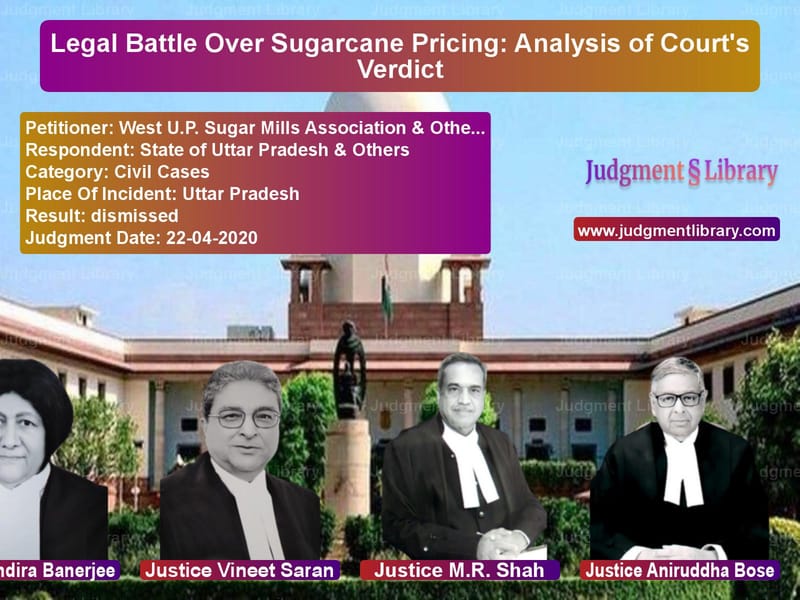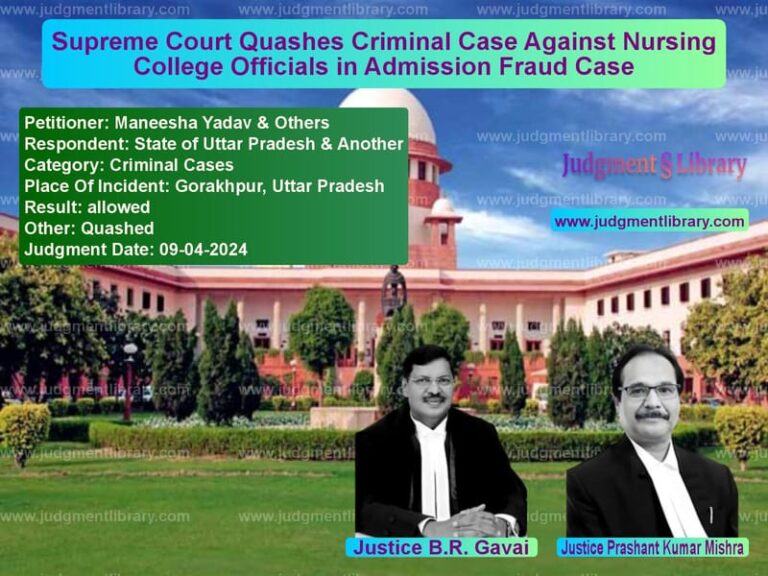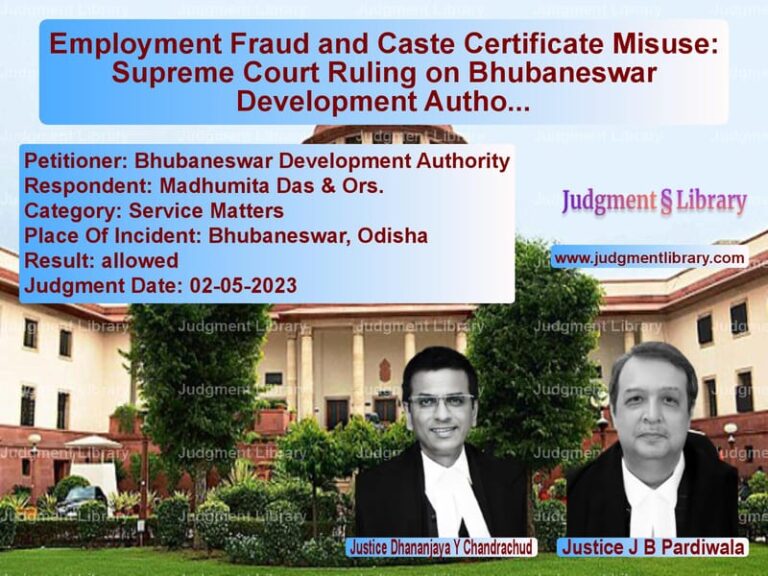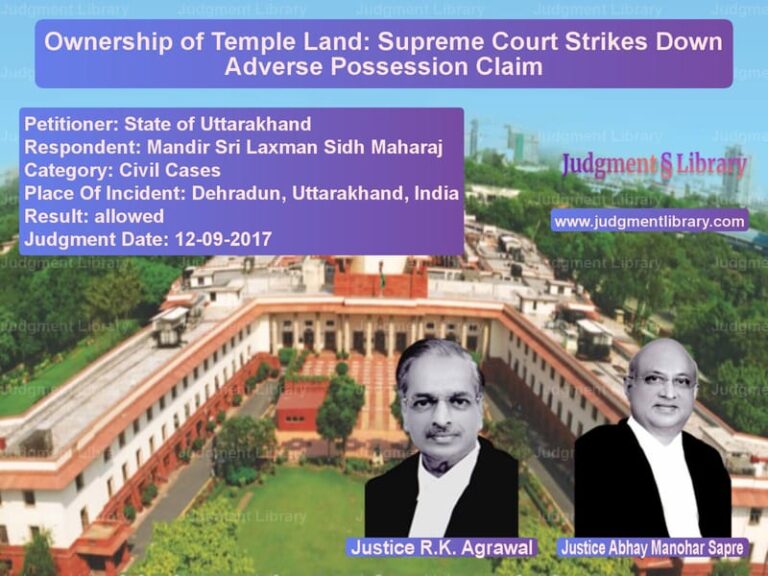Legal Battle Over Sugarcane Pricing: Analysis of Court’s Verdict
The case of West U.P. Sugar Mills Association & Others vs. The State of Uttar Pradesh & Others brings forth a crucial debate concerning the power of the state to regulate sugarcane pricing. At the heart of the matter lies the question of whether the State Government has the authority to fix the price of sugarcane beyond the minimum price set by the Central Government. This case involves a detailed examination of constitutional law, legislative competence, and the interplay between central and state legislation.
The Supreme Court examined whether the power conferred under the U.P. Sugarcane (Regulation of Supply and Purchase) Act, 1953, allowed the State Government to fix the State Advised Price (SAP) for sugarcane. The petitioners, West U.P. Sugar Mills Association and others, challenged the validity of SAP, contending that the Central Government alone had the exclusive authority to determine sugarcane pricing under the Essential Commodities Act, 1955, and the Sugarcane (Control) Order, 1966.
Background of the Case
The sugar industry is heavily regulated in India, given its economic significance and the large number of farmers involved in sugarcane cultivation. The dispute arose when the State Government of Uttar Pradesh fixed the SAP higher than the minimum price determined by the Central Government. The sugar mills opposed this, arguing that it was beyond the legislative competence of the State Government.
Arguments by the Petitioners
The West U.P. Sugar Mills Association, representing sugar mill owners, raised the following key arguments:
- Legislative Competence: The petitioners contended that the field of sugarcane pricing was occupied by the Central Government under the Essential Commodities Act, 1955. The State had no authority to fix an additional price.
- Repugnancy under Article 254: The petitioners argued that since the Central Government had already determined the minimum price, any conflicting price fixed by the State was repugnant under Article 254 of the Constitution and should be rendered void.
- Economic Viability: They claimed that imposing a higher SAP created financial distress for sugar mills, affecting their operational efficiency and financial sustainability.
Arguments by the Respondents
The State of Uttar Pradesh defended its power to fix SAP, arguing:
- Power under Section 16 of the 1953 Act: The State contended that Section 16 of the U.P. Sugarcane Act granted it the authority to regulate the purchase and supply of sugarcane, which included price fixation.
- No Conflict with Central Law: The State argued that SAP was always higher than the Central Government’s minimum price, meaning there was no direct conflict or repugnancy.
- Welfare of Farmers: The State emphasized that SAP was introduced to protect sugarcane farmers from exploitation by sugar mills and ensure a fair price for their produce.
Key Observations of the Court
The Supreme Court, in its judgment, made several crucial observations regarding legislative competence and repugnancy:
1. Legislative Authority of the State
The Court held that the power to regulate sugarcane pricing fell within the concurrent list under Entry 33 of List III of the Constitution. Since both Parliament and State Legislatures had the authority to legislate on this subject, the State was within its rights to determine SAP.
2. No Repugnancy Between SAP and Central Pricing
The Court observed that under the Sugarcane (Control) Order, 1966, the Central Government only fixed the minimum price. The State Government, in fixing SAP, ensured that it was higher than the minimum price, thereby not creating any repugnancy or inconsistency.
3. Protection of Farmers’ Interests
Emphasizing the welfare aspect, the Court stated:
“The purpose of SAP is to safeguard the interests of sugarcane growers who are not in a position to negotiate prices with powerful sugar mill owners. The State Government has a legitimate interest in ensuring that farmers receive a fair price for their produce.”
4. Distinction Between Minimum Price and SAP
The Court distinguished between the minimum price set by the Central Government and SAP set by the State. It held:
“While the minimum price ensures a base level of compensation for sugarcane farmers, SAP allows States to provide a higher price based on local economic conditions and farmer needs.”
Final Judgment
The Supreme Court ruled in favor of the State Government, upholding its authority to fix SAP. The Court concluded that:
- The fixation of SAP by the State Government was valid and within its legislative competence.
- The SAP did not conflict with the Central Government’s minimum price, as it was always higher.
- The pricing mechanism was essential for protecting sugarcane farmers.
Accordingly, the petition was dismissed.
Impact of the Judgment
The ruling reaffirmed the power of State Governments to fix SAP, ensuring better pricing for sugarcane farmers. It provided a clear interpretation of legislative powers under the Constitution and reinforced the idea that States could introduce additional protections for their farmers, even in sectors governed by central regulations.
Conclusion
The judgment in West U.P. Sugar Mills Association & Others vs. The State of Uttar Pradesh & Others stands as a landmark ruling in the sugar industry’s regulatory framework. It clarifies the concurrent legislative power of the State and Central Government, emphasizing that SAP is a tool for ensuring farmer welfare rather than a conflict with Central law. With this ruling, State Governments retain the power to ensure fair pricing in agricultural markets, strengthening the protection available to small farmers.
Petitioner Name: West U.P. Sugar Mills Association & Others.Respondent Name: State of Uttar Pradesh & Others.Judgment By: Justice Arun Mishra, Justice Indira Banerjee, Justice Vineet Saran, Justice M.R. Shah, Justice Aniruddha Bose.Place Of Incident: Uttar Pradesh.Judgment Date: 22-04-2020.
Don’t miss out on the full details! Download the complete judgment in PDF format below and gain valuable insights instantly!
Download Judgment: West U.P. Sugar Mill vs State of Uttar Prade Supreme Court of India Judgment Dated 22-04-2020.pdf
Direct Downlaod Judgment: Direct downlaod this Judgment
See all petitions in Contract Disputes
See all petitions in Consumer Rights
See all petitions in Public Interest Litigation
See all petitions in Judgment by Arun Mishra
See all petitions in Judgment by Indira Banerjee
See all petitions in Judgment by Vineet Saran
See all petitions in Judgment by Mukeshkumar Rasikbhai Shah
See all petitions in Judgment by Aniruddha Bose
See all petitions in dismissed
See all petitions in supreme court of India judgments April 2020
See all petitions in 2020 judgments
See all posts in Civil Cases Category
See all allowed petitions in Civil Cases Category
See all Dismissed petitions in Civil Cases Category
See all partially allowed petitions in Civil Cases Category







